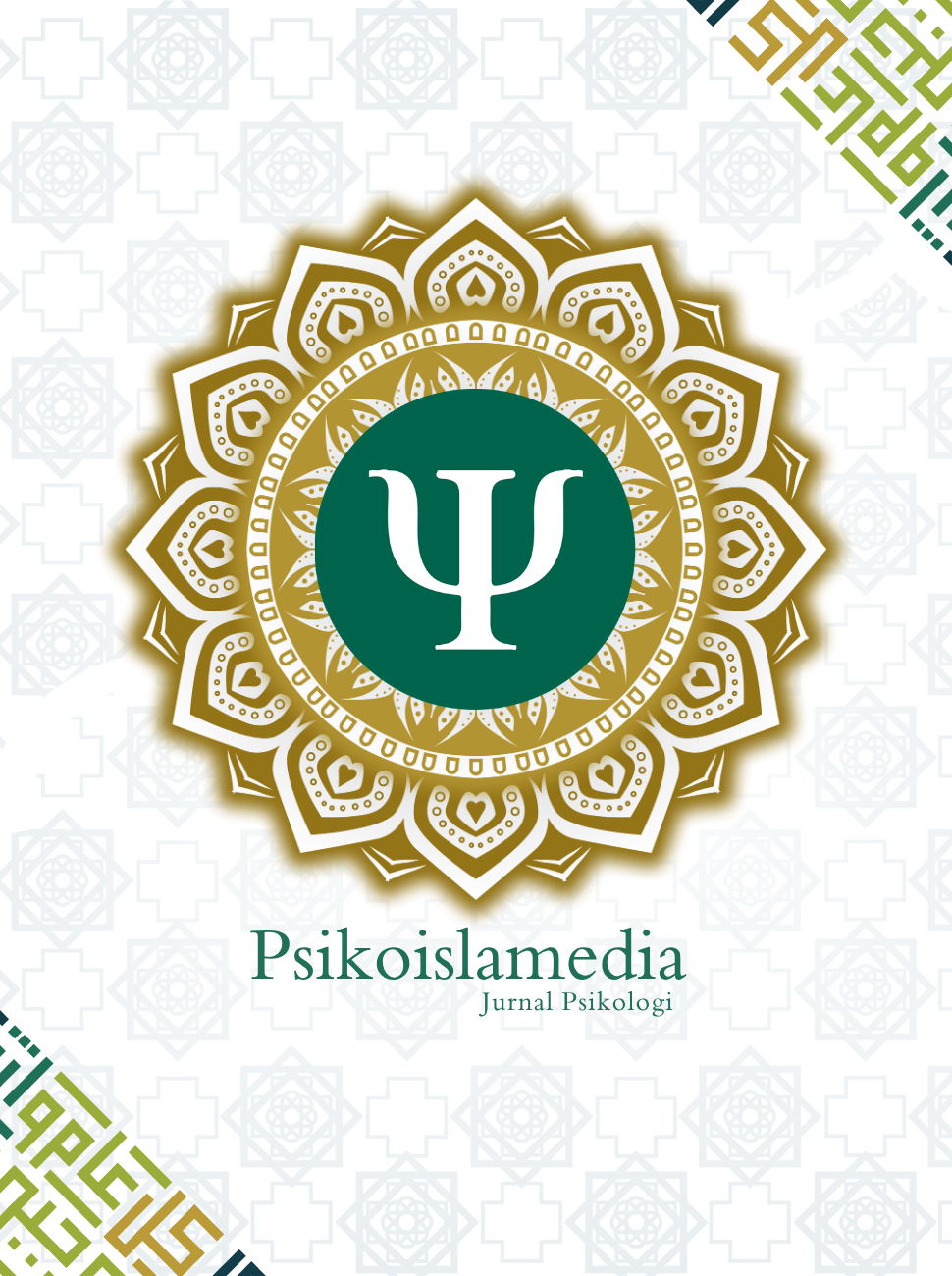Islamic Spiritual Intelligence and Work Performance: A Literature Review Study
DOI:
https://doi.org/10.22373/psikoislamedia.v9i1.22919Keywords:
Islamic Spiritual Intelligence, Work Performance, Literatur Study.Abstract
This study provides an extensive analysis of the literature regarding the effects of Islamic spiritual intelligence on the productivity of employees. Utilizing a diverse array of academic publications and empirical investigations, the manuscript delves into the conceptual framework of Islamic spiritual intelligence, its constituent elements, and its impact on various aspects of work performance in organizational settings. Moreover, the review delves into intermediary and moderating variables that configure the correlation between Islamic spiritual intelligence and work performance. Furthermore, it discusses practical implications for organizational decision-makers and proposes avenues for future research endeavors.
References
Abedi Jafari H, Rastgar A. The Emergence of Spirituality in Organizations: Concepts, Definitions, Presumptions and Conceptual Model. Iranian Journal of Management Sciences. 2007;2(5):99-121. Persian.
Abu HO, Rahim AH, Baba VV, Alias A. (2018). The relationship between spiritual intelligence and job performance among employees in the Malaysian public sector. J Int Stud, 11(1), 17-30.
Abdul Karim, A., & Jalil, M. A. (2019). The influence of Islamic spiritual intelligence on work engagement and innovative behavior. International Journal of Ethics and Systems, 35(1), 48-62.
Abdullah, A., & Adnan, N. A. (2018). The relationship between spiritual intelligence and job performance among employees in Malaysia. International Journal of Academic Research in Business and Social Sciences, 8(10), 495-508.
Abu Talib, M., Mohd Salleh, M. S., & Abdullah, S. (2017). Measuring Islamic spiritual intelligence among Muslim students in a Malaysian university: An exploratory factor analysis. Pertanika Journal of Social Sciences and Humanities, 25(1), 1-14.
Adnan, M., & Widodo, A. (2018). Investigating the Factors that Affect the Performance of Teachers in Indonesia. Journal of Education and Learning, 7(4), 313-318. https://doi.org/10.11591/edulearn.v7i4.1048
Ahmad, A. (2018). Islamic Spiritual Intelligence and Decision-Making Process: An Empirical Investigation. Journal of Islamic Marketing, 9(4), 940-954.
Ahmad, N., Saat, N. M., Abdul Talib, A. N., & Ghani, F. A. (2019). A review of literature on the measurement of spiritual intelligence. International Journal of Academic Research in Business and Social Sciences, 9(5), 579-590.
Ahmad, S., & Soelaiman, S. (2019). The relationship between spiritual intelligence and job performance: The mediating role of organizational citizenship behavior. Journal of Islamic Marketing, 10(4), 1132-1148.
Ahmad, N., & Kamaluddin, A. (2019). Relationship between spiritual intelligence and organizational citizenship behavior among academicians: The mediating role of psychological well-being. International Journal of Psychosocial Rehabilitation, 23(6), 4272-4281.
Akram, T., Ilyas, M., & Fatima, T. (2019). Impact of spiritual intelligence on employee engagement: The mediating role of job satisfaction. Journal of Spirituality in Mental Health, 21(1), 52-67.
Ali, S., Mahmood, S., & Khan, M. A. (2017). Islamic Spiritual Intelligence and Workplace Outcomes: Mediating Role of Workplace Ostracism. Journal of Business Ethics, 145(3), 543-556.
Amir, Hayat., Sumera, Rabia. (2022). Impact of islamic mysticism on work behaviors: an analytical study. الضحی, doi: 10.51665/al-duhaa.003.01.0129
Amir, Khudodod, Hussein., Chablullah, Wibisono., Dicky, Wijaya., Ihram, Bani, Gratitude. (2022). The Effect of Spiritual Motivation, Spiritual and Intellectual Intelligence on Religious Performance Mediated by Job Satisfaction. doi: 10.56225/ijassh. v1i3.52
Al-Swidi, A. K., & Mohamed, Z. (2018). The mediating effect of psychological well-being on the relationship between Islamic religiosity and job performance among Muslim employees. Journal of Business Ethics, 152(2), 449-464.
Al-Zyadat, M. I., Al-Hadid, I. A., & Masa'deh, R. E. (2017). The mediating role of psychological well-being between spiritual intelligence and job performance. Journal of Management Development, 36(9), 1169-1180.
Anwar, S., Rana, H. Spiritual intelligence and psychological wellbeing of Pakistani University students. Curr Psychol (2023). https://doi.org/10.1007/s12144-023-04717-8
Ariff, M. R. M., Amat, S., Bakar, N. A. A., & Razak, N. A. (2019). Measuring Islamic spiritual intelligence among engineering students in Malaysian polytechnics. International Journal of Academic Research in Business and Social Sciences, 9(10), 1061-1074.
Asharlous V, Dadashi Khas E. The effect of Managers’ spiritual intelligence on the performance of public organizations employees. Quarterly Journal of Innovation and Creativity in Human Sciences. 2013;2(3):97-135. Persian.
Aqa Babaii N, Farahani H, Fazeli Mehrabadi AR. Spiritual Intelligence and Subjective Welfare. Journal of Psychology and Religion. 2011;4(3):83-96. Persian.
Baharuddin. (2007). Religious knowledge and religious activity among elderly Muslims in Peninsular Malaysia. The Journal of Social Sciences Research, 3(1), 146-150.
Baharuddin, H., & Ismail, I. (2013). Spiritual intelligence, religious knowledge, and moral conduct among elderly Muslims in Peninsular Malaysia. Asian Social Science, 9(5), 56-63.
Baharuddin, E., & Ramli, Z. (2014). Definisi dan Konsep Kecerdasan Ruhaniah Menurut Perspektif Sarjana Islam. Jurnal Penyelidikan Islam JAKIM, 44-58.
Büssing, A., Recchia, D. R., Baumann, K., & Frick, E. (2019). Spirituality and Job Satisfaction among Health Care Professionals. Explore: The Journal of Science and Healing, 15(4), 258-264.
Farhangi AA, Fattahi M, Vasegh B. Workplace spirituality and its role in improving organizational citizenship behavior. Organizational Culture Management. 2006;4(13):5-36. Persian.
Fakhri, N. A., & Ramayah, T. (2018). The role of Islamic spiritual intelligence in enhancing employee work performance. International Journal of Business and Society, 19(S1), 106-118.
Hanefar, S., Ismail, I., Mahmud, R., & Ismail, S. (2016). The development of spiritual intelligence based on the integration of Islamic and Western philosophy. International Journal of Academic Research in Business and Social Sciences, 6(11), 246-254.
Hashim, S. A., Bakar, S. R. S. A., & Rasheed, S. Z. (2018). The development of an Islamic spiritual intelligence instrument for university students. Journal of Islamic, Social, Economics and Development, 3(9), 35-50.
Jannah, N., & Simanjuntak, M. (2020). Islamic spiritual intelligence and organizational citizenship behavior: The mediating effect of work motivation. International Journal of Applied Business and Economic Research, 18(1), 141-156.
Kaur, P., & Basu, S. (2019). Islamic spiritual intelligence, perceived job autonomy and employee engagement: evidence from the UAE. International Journal of Islamic Marketing and Branding, 4(1), 38-54.
Khairuddin, I., & Saad, M. S. (2020). The mediating effect of spiritual intelligence on the relationship between Islamic work ethics and employee job satisfaction. International Journal of Islamic and Middle Eastern Finance and Management, 13(4), 548-566.
Khan, S., & Fatima, T. (2019). The relationship between spiritual intelligence and employee well-being: The mediating role of perceived organizational support. Journal of Religion and Health, 58(4), 1309-1326.
Mahasneh, A. M., Shammout, N. A., Alkhazaleh, Z. M., Al-Alwan, A. F., & Abu-Eita, J. D. (2015). The relationship between spiritual intelligence and personality traits among jordanian university students. Psychology Research and Behavior Management, 8, 89–97. https://doi.org/10.2147/PRBM.S76352
Mohammad, Anwar., Muafi, Muafi., Widodo, Widodo., John, Suprihanto. (2022). Psychological Distress Model towards Human Resource Performance in Islamic Spiritual Intelligence Context. Asian journal of business research, doi: 10.14707/ajbr.220120
Qurratul, Aini., Saad, Ghazi, Talib., Tawfeeq, Alghazali., Muneam, Hussein, Ali., Zahraa, Tariq, Sahi., Tribhuwan, Kumar., Iskandar, Muda., Andrés, Alexis, Ramírez-Coronel., Denok, Sunarsi. (2023). Spiritual intelligence, spiritual health and occupational stress in Islamic organisations. Theological Studies/Teologiese Studies, doi: 10.4102/hts. v79i1.8228
Rahman, Z. A., & Shah, I. M. (2015). Measuring Islamic Spiritual Intelligence. Procedia Economics and Finance, 31(15), 134–139. https://doi.org/10.1016/s2212-5671(15)01140-5
Rahman, A., & Shah, I. A. (2015). Islamic Spiritual Intelligence as the Catalyst for Behavioral Transformation. Journal of Islamic Thought and Civilization, 5(2), 53-68.
Sadeghi, K., & Marzoughi, R. (2017). The Relationship between Spiritual Intelligence and Organizational Performance of Teachers. International Journal of Education and Literacy Studies, 5(3), 1-8.
Sultana, S., & Khalid, S. (2017). The Impact of Islamic Spiritual Intelligence on Muslim Consumers' Halal Food Purchase Intention. Journal of Islamic Marketing, 8(3), 364-378.
Zohar, D., & Marshall, I. (2001). Spiritual intelligence: The ultimate intelligence. Bloomsbury Publishing.
Zohar, D. (2012). Spiritual intelligence: The ultimate intelligence (2nd ed.). Bloomsbury Publishing.
Zuki, Kurniawan. (2023). Analysis of Employee Performance Through Islamic Work Environment Factors. doi: 10.35723/ajie. v6i1.325
Downloads
Published
Issue
Section
License
Authors who publish in this Journal agree to the following terms:
- Authors retain copyright and grant the journal right of first publication with the work simultaneously licensed under Attribution-ShareAlike 4.0 International (CC BY-SA 4.0) allows others to share the work with an acknowledgment of the work's authorship and initial publication in this journal.
- Authors are able to enter into separate, additional contractual arrangements for the non-exclusive distribution of the journal's published version of the work (e.g., post it to an institutional repository or publish it in a book), with an acknowledgment of its initial publication in this journal.
- Authors are permitted and encouraged to post their work online (e.g., in institutional repositories or on their website) prior to and during the submission process, as it can lead to productive exchanges, as well as earlier and greater citation of published work. (See The Effect of Open Acces)














